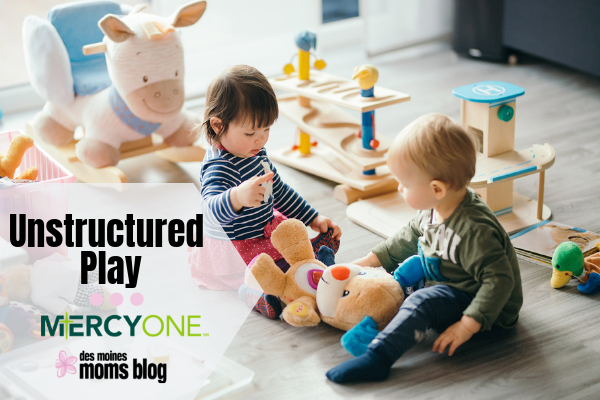I remember well the mom sitting across from me with her school-aged son during a well child exam. Spread open on her lap was a planner, and every spot from waking until bedtime was filled.
“When do you play?” I asked her son.
“Play?” he asked, “Why would I play?”
Why indeed?
Children are scheduled for many activities that can be considered play. Organized sports, sport camps, art camps, dance lessons, Russian lessons, digital games, even family game night. These activities are valuable, but unlike unstructured play time, they are all goal oriented, involve rules and can be motivated by wanting to keep up with peers. Over-scheduling can cause children to experience stress and fatigue, in addition to the family feeling disconnected and exhausted.
The Importance of Unstructured Play
Unstructured play time (or free time for the preteen and teen) is essential for emotional, cognitive, physical and social development. It does not mean unsupervised or unsafe play. A parent can participate or not. The play is child-directed. There is no goal; adults are not giving directions or corrections.
For example: letting a child build whatever she wants from blocks is unstructured, following a pattern for a Lego house or telling her that houses aren’t pink is structured. Making up silly songs is unstructured, singing songs to learn the state capitols is structured.
Benefits of Unstructured Play
While we all know that unstructured play enhances a child’s imagination, there are numerous other benefits. They include:
- Healthy brain development. The child makes up scenarios, rules, what works, what doesn’t work and adapts accordingly. This increases self-confidence and resiliency, which will help in future challenges.
- Enhanced social skills. The child learns to negotiate, take turns, cooperate, care and advocate for himself.
- Increased physical activity. Kids should have at least 60 minutes of physical activity daily. Unstructured play is an excellent way to incorporate this.
Unstructured play is inexpensive.
In addition to traditional toys such as cars, stuffed animals or dolls, many nontraditional toys can be used. Some ideas are: age-appropriate sized boxes, paper towel rolls, sticks, stones, colors, paper, buckets, paint brushes, dress up clothes, scarves, blankets, and hula hoops. If the child does not know what to do, ask an open-ended question or two to get them started, then sit back and let the child lead the way.
Balance between structured and unstructured play is key.
While the calendar is quickly getting filled up with fun summer camps and activities, keep some time open for blanket forts, rock sales, three-year-old concerts, and basketball shows. Not only will you get to know your child better, but it will also ease the pressure of a hectic schedule and always needing to be somewhere.
No rules, no agenda and free time in the back yard? Count me in!
 Lynn Howard, ARNP, is a pediatric nurse practitioner at MercyOne Clive Pediatrics Care Clinic. To schedule an appointment with Lynn, please call 515-222-7337.
Lynn Howard, ARNP, is a pediatric nurse practitioner at MercyOne Clive Pediatrics Care Clinic. To schedule an appointment with Lynn, please call 515-222-7337.
Connect with MercyOne Des Moines Medical Center
Website: MercyOne.org/desmoines
Twitter: @MercyOneDSM
Facebook: @mercyonedesmoines
Instagram: @mercyonedesmoines
Pinterest: @MercyOneDesMoines
The post is part of a series of sponsored post by MercyOne Des Moines Medical Center.


















